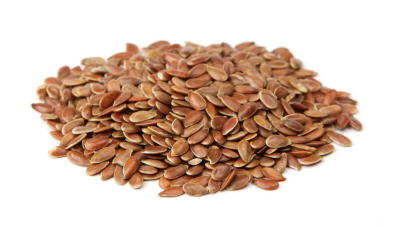
Flaxseeds can be found in several health products these days, including whole grain breads, granola bars, protein bars, and blue corn tortilla chips. Should you be purchasing flaxseed, flaxseed oil, or other products containing flax?
You definitely should. I try to eat flaxseed every day, and for good reason. It is beneficial for vegetarians like myself to eat flaxseed and flaxseed oil. They are the highest plant-based sources of alpha linolenic acid (ALA), an omega-3 essential fatty acid. Two tablespoons of flaxseed contains 3.5 g of omega-3, which amounts to 140.4% of your daily value intake, and the composition of flaxseed oil contains 58% omega-3.
Omega-3 is found primarily in fish and seafood such as cod liver, halibut, trout, salmon, and sardines, but flaxseed actually contains more omega-3 than fish oils and it is an excellent source for vegetarians and vegans.
How Flaxseed Reduces Your Blood Pressure?
Omega-3 (alpha linolenic acid) is widely known to help reduce your risk of cardiovascular diseases. When your blood pressure is abnormally high, it can result in premature death from heart disease, stroke, or atherosclerosis. There is research that links the consumption of flaxseed or flaxseed oil with helping lower blood pressure in people with hypertension (high blood pressure).
One of the benefits of flaxseeds is helping lower blood pressure. A 2012 University of Manitoba study conducted at St. Boniface Hospital Research determined that adding 30 grams of milled flaxseed every day for six months could help lower blood pressure. The study followed 110 patients with peripheral artery disease, which is strongly linked with hypertension.
Normal blood pressure ranges from 100/70 to 120/80 mm HG (millimeters of mercury, a pressure reading) and hypertension patients are over 140/90 mm Hg. The lower number signifies the diastolic blood pressure at rest between heartbeats, and the systolic blood pressure, the higher number, indicates your blood pressure while the heart is pumping. During the study, the mulled flaxseed consumption lowered systolic blood pressure at a 15 mm Hg average, while diastolic blood pressure dropped 8 mm Hg on average. There was also ALA increases, and a rise of enterolactone, a potent antioxidant.
There patients who were adding a placebo instead had much different results. The systolic blood pressure had increased slightly and the diastolic blood pressure stayed constant. They also didn’t see any changes in ALA or the antioxidant.
“These anti-hypertensive effects of flaxseed are amongst the most potent ever observed,” said Dr. Grant Pierce, executive director of research at St. Boniface Hospital, and a professor of physiology at the University of Manitoba, Faculty of Medicine. “The change in blood pressure from flaxseed could result in about a 50% reduction of strokes and 30% less heart attacks.”
Flaxseed also contains other nutrients linked to help lower blood pressure, including dietary fiber, magnesium, and vitamin E. High fiber diets are also known to significantly lower blood pressure, where hypertension can result of lacking magnesium in the body. Vitamin E, a fat-soluble vitamin, helps make red blood cells in the body.
Studies involving flaxseed oil have shown an improvement with arterial blood flow within obese people, and it also reduces the risk of heart issues in young men.
Other Benefits of Flaxseeds
Flaxseeds are linked with reducing the risk of breast cancer in women because they contain a concentrated source of special lignan phytoestrogens. The phytonutrients form when intestinal flora converts into enterodiol and enterolactone, which are hormone-like substances that can demonstrate protective abilities against breast cancer.
Another one of the benefits of flaxseeds has to do with its dietary fiber which promotes the digestive system, increasing bowel movements, decreasing constipation, and they are known to have a laxative effect on the body. The ALA in flaxseed oil can also help reduce anxiety symptoms, according to one study.
Best Way to Prepare Flaxseeds
It is best to grind them before serving to receive all the benefits of flaxseeds. During this process, flaxseeds break their hard shell, which allows you to digest and absorb all of their beneficial nutrients. You can easily grind your flaxseeds in a coffee grinder.
You can add flaxseeds to your fruit, cereal, smoothie, green salad, cooked vegetables, or they also make a welcomed addition to granola. You can also use flaxseed oil as part of a salad dressing.
Even if you’re not vegetarian, flaxseeds are an excellent addition of omega-3 to your diet and can be a great way to help you lower blood pressure. The next time you see a healthy product with flax, give it a try, or grind them up to obtain every one of the benefits of flaxseeds.
Related:
Sources:
“Flaxseed may lower blood pressure in hypertension,” Hopital St-Boniface Hospital web site, Nov. 5, 2012; http://www.sbrc.ca/2012/11/flaxseed-may-lower-blood-pressure-in-hypertension/.
“Flaxseed May Lower Blood Pressure in People With Hypertension,” TriHealth web site; http://www.trihealth.com/discover-trihealth/your-trihealth/newsroom/triHealth-news-and-releases/news-releases/Flaxseed-May-Lower-Blood-Pressure-in-People-With-Hypertension/, last accessed Jan. 15, 2014.













